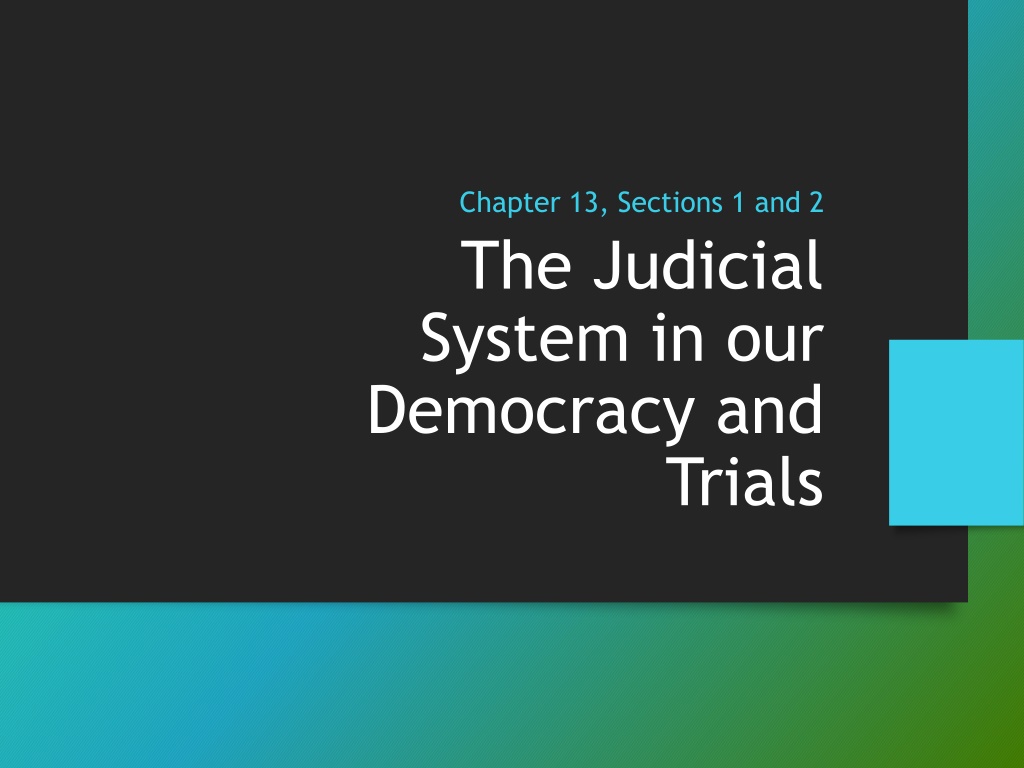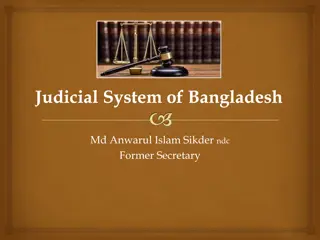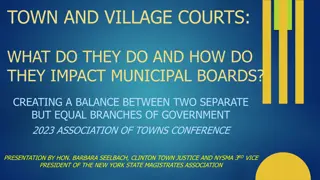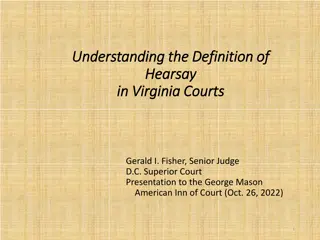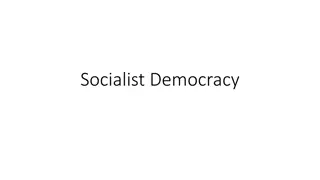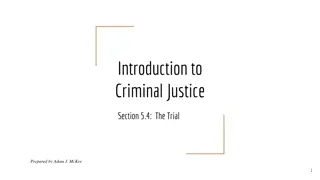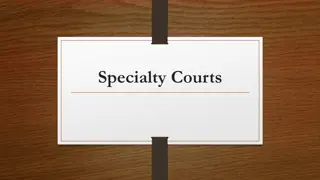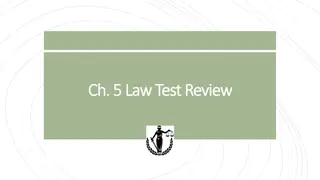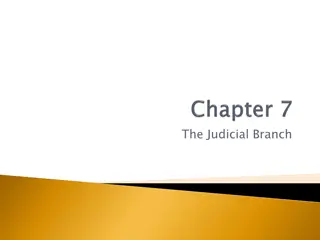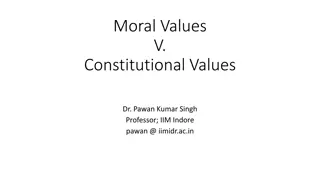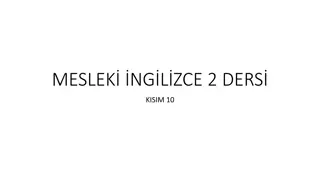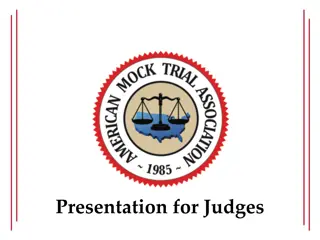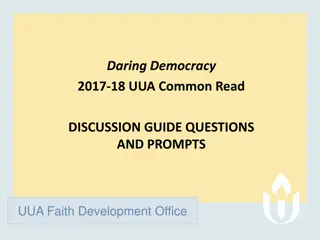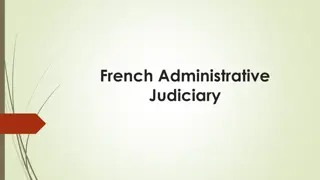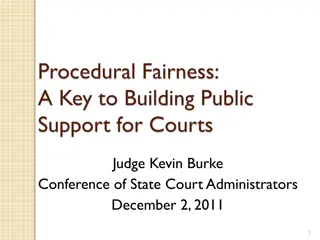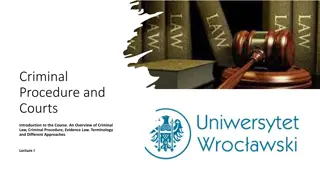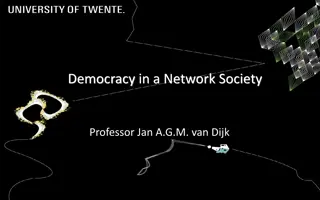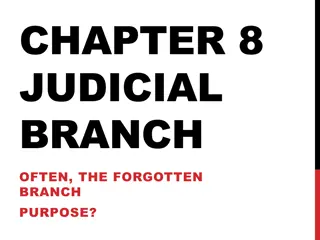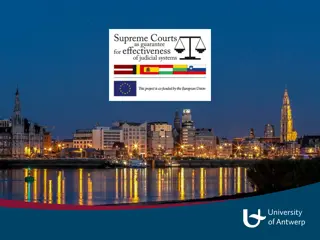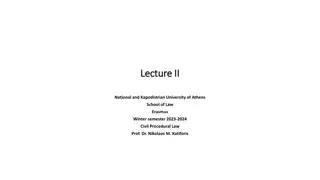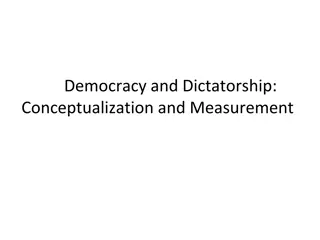The Judiciary and Trial Courts in a Democracy
Learn about the judiciary's role in democracy, including principles like judicial review and independence. Explore the function of trial courts, the trial process, and the importance of juries in resolving legal disputes.
Download Presentation

Please find below an Image/Link to download the presentation.
The content on the website is provided AS IS for your information and personal use only. It may not be sold, licensed, or shared on other websites without obtaining consent from the author.If you encounter any issues during the download, it is possible that the publisher has removed the file from their server.
You are allowed to download the files provided on this website for personal or commercial use, subject to the condition that they are used lawfully. All files are the property of their respective owners.
The content on the website is provided AS IS for your information and personal use only. It may not be sold, licensed, or shared on other websites without obtaining consent from the author.
E N D
Presentation Transcript
Chapter 13, Sections 1 and 2 The Judicial System in our Democracy and Trials
Explain how the judiciary acts according to the principles of democracy Explain Describe Describe the power of judicial review Identify how the judiciary acts as an independent branch of government Identify In this lesson you Explain Explain the function of trial courts will: Compare Compare criminal trial courts to civil trial courts Outline Outline the trial process Identify Identify the importance of juries
Early Systems of Law Religious rules served as an early model for laws. The Code of Hammurabi used categories much like criminal law, property law, and family law. Roman law spread with the Roman Empire. English common law is the most important basis of the American legal system. Law in democratic societies resolves conflict, defines criminal acts, and sets their punishments.
Principles of Democracy in the Judiciary Laws provide guidelines for behavior, and courts provide a solution when laws are broken. Laws must be clear, known to all, obeyed by all, and equally, fairly, and consistently enforced. Judicial review is the power of courts to declare unconstitutional a law or official action. Through the power of judicial review, the judicial branch checks the other two branches. The judicial branch is limited by the executive and legislative branches and by the law itself.
Judicial Independence In a democracy, courts must act impartially and decide fairly without outside pressure. In some states and in the federal court system, judges are appointed for life terms. Judges in most states, whether elected or appointed, must face retention elections.
The Function of Trial Courts Criminal trial courts hear cases about crimes such as burglary or murder. Civil trial courts hear cases where one person or group accuses another of causing harm. Trial courts have original jurisdiction over both criminal and civil cases. The United States has an adversarial system, in which each side presents witnesses and evidence. The judge functions as a referee to ensure fairness.
The Trial Process In a civil trial, the plaintiff accuses the defendant of causing damage. In a criminal trial the government, as prosecutor, accuses the defendant of a crime. The jury gives a verdict based on evidence presented in court. If a defendant cannot afford a private attorney, the state or trial judge appoints a public defender. Many civil cases settle out-of-court, and many criminal cases are settled by plea bargains.
Juries The Fifth Amendment requires a grand jury indictment before trial in a federal court for a serious crime. The Sixth Amendment guarantees the right to a jury trial for criminal cases in federal and state courts. The Seventh Amendment guarantees the right to a jury trial for civil cases in federal courts. Citizens have a civic duty to serve on juries when called upon. Juries must reflect the diversity of the community in which the trial is held.
On which early system of law did American colonists most depend? A.the Justinian Code B.the Twelve Tables C.the Code of Hammurabi D.English common law
In our system of checks and balances, judicial review is A.a check on the judicial branch by the legislative branch B.a check on the judicial branch by the executive branch C.a check on the executive branch by the judicial branch D.a check on the legislative and executive branches by the judicial branch
Judicial review is the power of courts to say that laws and government actions are invalid because A.they conflict with previous laws or government actions. B.they conflict with the Constitution. C.they are not written clearly enough to interpret consistently. D.they have not been applied equally and fairly.
Which of the following represents a check on the judicial branch by the executive branch? A.The president appoints federal judges. B.The Senate approves the appointments of federal judges. C.The courts can invalidate an executive order. D.Congress can override a court decision.
An independent judiciary is essential to our democracy because A.judges must belong to a political party. B.judges must run for election. C.judges must act impartially. D.judges must reflect the views of their constituents.
According to the Constitution, courts can A.change laws to clarify their meanings. B.only decide issues brought to them as cases. C.give Congress advice about the constitutionality of a proposed bill. D.advise police about the legality of an act before the perpetrator is arrested.
Which of the following represents a difference between criminal trial courts and civil trial courts? A.Only criminal trial courts use a jury. B.Only civil trial courts hear cases involving payment for causing harm. C.Only criminal trial courts use a judge. D.Cases originate only in civil trial courts.
In a civil trial, the party accusing someone of causing harm is the A.plaintiff. B.defendant. C.prosecutor. D.government.
In a criminal trial, what party serves as the prosecutor? A.the lawyer for the defendant B.the lawyer for the plaintiff C.the judge D.the lawyer for the government
A civil or criminal suit is brought in court against the A.public defender. B.plaintiff. C.perpetrator. D.defendant.
What is the role of the jury in a trial? A.to sentence individuals convicted of a crime B.to give a verdict based on the evidence presented C.to accept or reject plea bargains D.to indict but not determine guilt or innocence
The rights described in the Sixth Amendment are guaranteed through the use of A.judges. B.prosecutors. C.public defenders. D.grand juries.
How are most criminal cases resolved? A.through a trial B.by a jury C.by a judge D.through a plea bargain
What is the role of a grand jury? A.to mediate pretrial agreements between defendants and plaintiffs B.to determine whether there is sufficient evidence to bring a person to trial C.to hear evidence and render a verdict in cases involving serious crimes, such as murder D.to hear cases involving people who cannot afford an attorney
